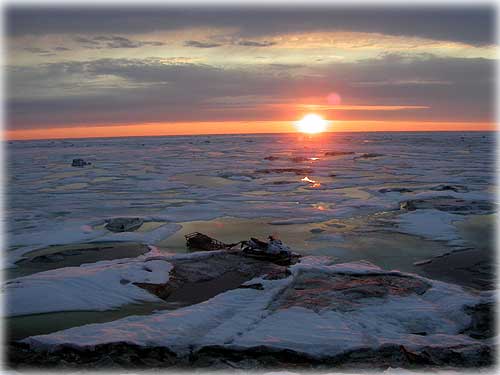 Alaska scientists aim at offering
climate services
Alaska scientists aim at offering
climate services
By Ned Rozell
March 04, 2007
Sunday
Seasons are not what they once were in Alaska. Ice roads on Alaska's
North Slope have a shorter lifespan than they had 30 years ago.
The extent of sea ice hugging the northern coastlines gets smaller
every year. These changes affect Alaskans and people who work
in Alaska, and a few scientists just received funding to make
climate science user-friendly for those people.
 Is Sea ice outside
Shishmaref safe for travel? In a new program, Alaska scientists
will try to take existing information from NOAA and make it more
useful to everyday people.
Is Sea ice outside
Shishmaref safe for travel? In a new program, Alaska scientists
will try to take existing information from NOAA and make it more
useful to everyday people.
Photo by Ned Rozell
"If I'm buying boats to move oil to villages on the west
coast of Alaska, I need to know if I should buy boats to handle
broken ice or no ice at all," said Dan White, the head of
the Institute of Northern Engineering at the University of Alaska
Fairbanks. "Right now, there are no climate services that
tell you what kind of ice to expect in five years off the coast
of Alaska."
White, along with John Walsh of the International Arctic Research
Center, Fran Ulmer of the Institute for Social and Economic Research
at UAA, and Craig Gerlach of UAF's Department of Anthropology
are among the scientists involved with a project to make National
Oceanic & Atmospheric Administration products more applicable
to people affected by climate change in Alaska. They've teamed
to create the Alaska Center for Climate Assessment and Policy.
"Our intent is to make NOAA's scientific findings as well
as operational findings more useful to the people in a region,"
said Walsh, chief scientist at the International Arctic Research
Center. "What do people out there need that they could be
getting from NOAA research?"
NOAA is the agency that runs the National Weather Service, the
National Ice Center, and the Climate Prediction Center. The Alaska
scientists are aiming to find out how NOAA products might better
serve seal hunters, oil companies, barge operators and other
people who live and work in Alaska.
Sharon Alden is a potential customer of the new service. A meteorologist
for the Alaska Interagency Coordination Center at Fort Wainwright,
she helps firefighters by giving them detailed weather briefings.
During the fire season, she could use some specific information
that's not currently available but might be lurking in the data
already gathered by researchers and technicians.
"I'd like to know the persistence of (weather) patterns
that could bring us fire danger - a pattern that causes lightning
or fire starts in remote areas - or patterns that would eliminate
fire danger," Alden said.
She'd also like to see monthly average upper-level wind patterns
over Alaska and the north Pacific.
"That would be pretty cool," she said.
Alden said someone at NOAA's Climate Prediction Center or Climate
Diagnostic Center might be able to produce the latter product,
while a local grad student or someone else funded by the new
project might be able to work out predictions of how persistent
fire-weather patterns will be.
The scientists involved with the program chose three pilot projects
- a study on the effects of midwinter pumping of tundra ponds
to make ice roads on the North Slope, another on how climate
change is interacting with other stresses on Yukon Flats villages,
and a third on the nature of sea ice in the coastal waters off
Alaska.
"We're already finding there's a need for ice information
beyond what NOAA produces," Walsh said. "We have no
information on ice thickness or stability, and that's what people
are interested in."
During the five-year project and beyond, the researchers hope
to be able to apply science to serve the needs of people affected
by a changing Alaska.
"This (project) should be driven by user needs, not what
researchers want to do," Walsh said.
This column is provided
as a public service by the Geophysical
Institute,
University of Alaska Fairbanks, in cooperation with the UAF
research community.
Ned Rozell [nrozell@gi.alaska.edu]
is a science writer at the institute.
E-mail your news &
photos to editor@sitnews.us
Publish A Letter on SitNews Read Letters/Opinions
Contact the Editor
SitNews
©2006
Stories In The News
Ketchikan, Alaska
|

